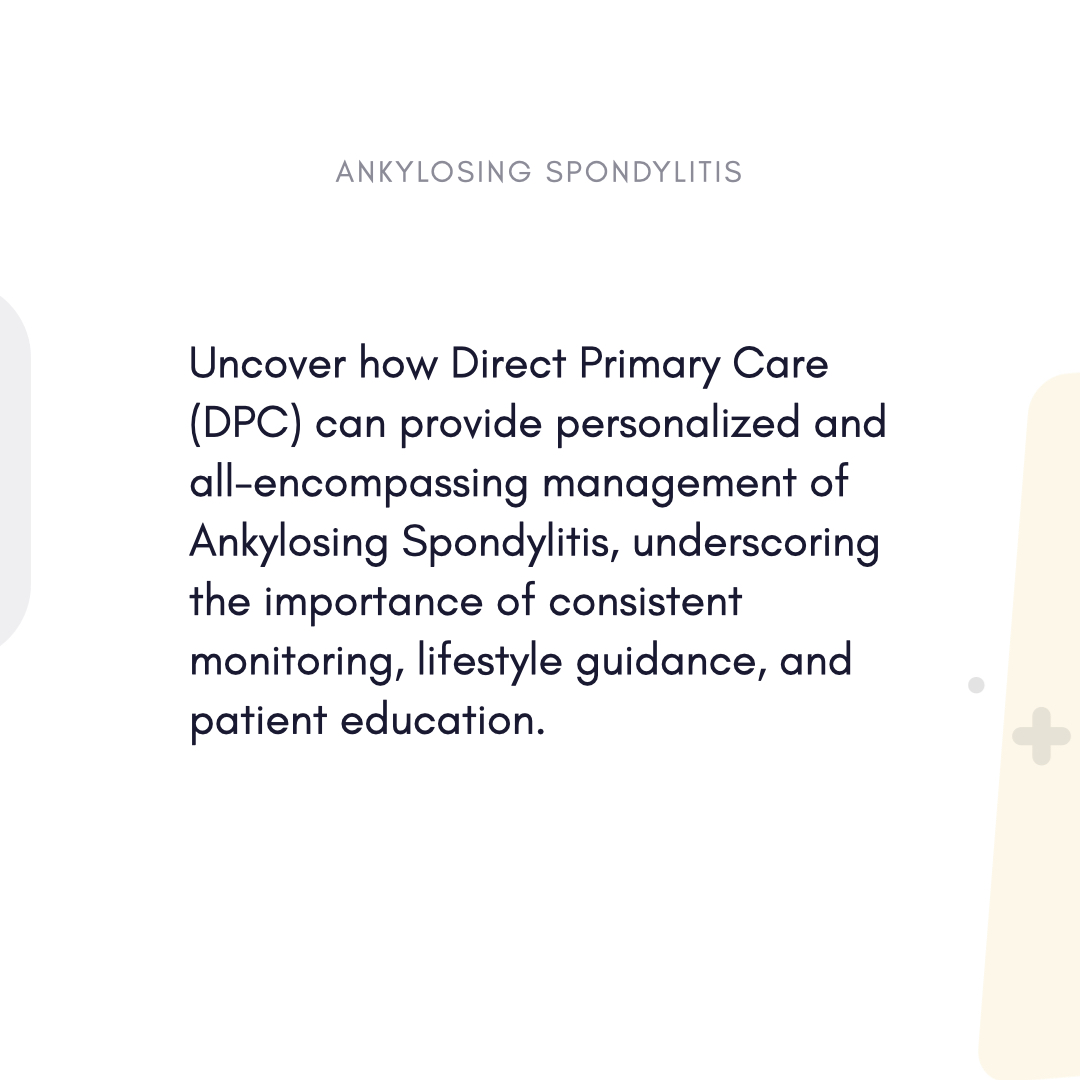Ankylosing Spondylitis (AS) and Direct Primary Care (DPC): Comprehensive, Patient-Centered Care
The chronic inflammatory arthritis known as ankylosing spondylitis (AS) mostly affecting the spine and sacroiliac joints causes pain, stiffness, and possible spinal fusion. Reducing inflammation, maintaining mobility, and avoiding complications all depend on lifelong attention to AS management. Combining timely access to experts, individualized treatment plans, and ongoing support to enhance quality of life for AS patients, Direct Primary Care (DPC) provides a customized approach.

Knowing Ankylosing Spondylitis: Essential Difficulties
- Core symptoms: Chronic back pain, morning stiffness, less spinal flexibility, tiredness.
- Systemic Effects: Heart risks; uveitis (eye inflammation); enthesitis, inflammation where tendons or ligaments attach to bone.
- Complications: Spinal fusion, osteoporosis, diminished lung capacity, mental health issues including anxiety and depression.
- Diagnosis: Imaging (X-rays, MRI); HLA-B27 genetic testing; elevated inflammatory markers (CRP, ESR).
How DPC Improves AS Management
Designed as a membership model (USD 100–USD 200/month), Direct Primary Care (DPC) provides unlimited access to a primary care physician. This translates for AS patients as:
- Not waiting for specialist coordination or symptom evaluations.
- Clear pricing—discounted labs, imaging, and biologic treatments.
- Comprehensive treatment meeting lifestyle, emotional, and physical needs.
1. Fast Diagnosis and Expert Coordination
- Imaging referrals: cash-pay rates (USD 100–USD 300 X-rays or MRIs of the spine/sacroiliac joints).
- Teamwork among rheumatologists: Quick referrals for treatments modulating diseases (such as biologics).
- Track CRP/ESR and liver/kidney function throughout treatment.
2. Customized Treatment Plans
DPC combines according to American College of Rheumatology (ACR) and Spondylitis Association of America (SAA) recommendations:
- Medications:
- First-line therapy—that is, naproxen—at wholesale rates (USD 5–USD 10/month).
- Working with specialty pharmacies, coordinate TNF inhibitors (adalimumab) or IL-17 inhibitors (secukinumab).
- Strategies outside of pharmacology:
- Therapist's physical treatment: Designed specifically to keep flexibility and posture, yoga, swimming, or Pilates can all help.
- Changes in lifestyle: Quitting smoking, ergonomic offices, and customized workout schedules.
3. Preventive and Supportive Treatment
- Bone health: Osteoporosis screening uses dual-energy X-ray absorptiometry (DEXA).
- Mental health referrals: Counseling for anxiety and depression linked to chronic pain.
- Teach flare recognition and self-management skills to patients.
DPC's Customized Treatment Plans for AS Patients
Customized treatment plans created by DPC for AS patients meet personal needs including medication adjustments and exercise regimens consistent with ACR recommendations.
- Long-term patient-provider interactions: Guarantee consistent monitoring of disease progression and treatment efficacy.
- Accessibility: Same-day or next-day visits and 24/7 telehealth support for acute flares or complications including uveitis.
- Multidisciplinary treatment: Seamless coordination with rheumatologists, physical therapists, and dietitians forms comprehensive management.
DPC's Personalized AS Management
The American College of Rheumatology (ACR) stresses personalized plans, which DPC offers:
- For early-stage AS: NSAID optimization combines efficiency with gastrointestinal/cardiovascular risks.
- Exercise plans: Organized routines meant to maintain mobility and lower stiffness.
- For advanced AS:
- Management of biologic systems: Track for side effects—such as infections—then modify dosage depending on disease activity.
- Low-dose corticosteroids or neuromodulators—such as gabapentin—may help with refractory pain.
- Regarding systemic complications: Uveitis coordination calls for quick ophthalmology referrals.
- Frequent blood pressure and lipid monitoring help prevent cardiovascular diseases.
Real-Life Success Stories
- Case 1: David, 34, avoided spinal fusion by halving flares with DPC-coordinated adalimumab and daily stretching.
- Case 2: Through DPC's pharmacy relationships, 42-year-old Lena saved USD 2,000 a month on biologics, so maintaining her active lifestyle.
FAQs on DPC and Ankylosing Spondylitis
- Q: Is DPC able to write biologics like Humira?
A: Indeed! DPC doctors arrange prior authorizations with rheumatologists and specialty pharmacies.
- Q: Are sessions of physical therapy covered?
A: DPC bargains for cash rates (USD 40–USD 70/session) against historically USD 120+.
- Q: How does DPC address mental health support?
A: Referrals to often discounted-rate therapists specializing in chronic illness.
Why DPC Will Transform AS Care?
- Stops advance: Early biologics use lessens irreversible spinal damage.
- Simplifies complexity: One provider schedules labs, imaging, and rheumatologists.
- Educating patients: On stress management, posture, and exercise builds self-efficacy.
How DPC Specifically Improves AS Management
DPC's approach fits ACR/SAA recommendations by:
- Giving early intervention top priority: Fast biologics and diagnosis access.
- Enabling continuity: Frequent observation of disease activity and modification in treatment approach.
- Cost reduction: Clear pricing breaks down obstacles to important treatments.
Control Your AS Journey with DPC
Though Ankylosing Spondylitis is a lifetime struggle, DPC gives you a partner committed to individualized, easily available, thorough treatment. DPC guarantees you stay active, lower pain, and avoid complications by combining customized treatments, multidisciplinary support, and continuous monitoring—so transforming your management of AS.






